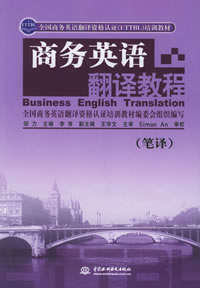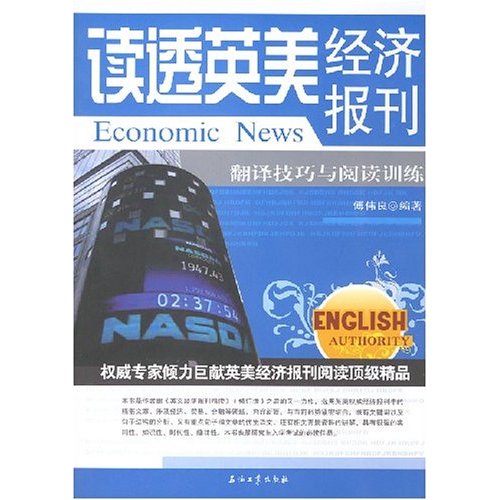Getting Started as a Translator:Gleanings from Honyaku (第三部分)
作者:古龙 2009-07-04




语际翻译公司 转载请注明https://www.scientrans.com
∗本栏目部分文章内容来自互联网,部分已经过本站编辑和整理,如有版权事宜请联系Email/MSN jesczhao@hotmail.com
The well-worn marketing phrase applies:
Just do it.
Richard Sadowsky
________________________________________
You can certainly become a Japanese translator with no experience of living in Japan. You just can't become a good one.
Many people have stated that this does not hold true for scientific/technical translation, but I don't even think this is the case. Why?
For one thing, you will still have to converse with Japanese clients on the phone, and your spoken Japanese will have to be good enough to give them confidence in your abilities. Unless you are some kind of prodigy, your spoken Japanese is likely to sound stilted and unnatural without at least a year of living in Japan. And no hanging out with mostly foreigners, either (he says wagging his finger).
Further, even "technical" translation is hardly ever 100% technical. There are always words or phrases that you must have a handle on the language as a living thing to understand.
On a different note, I would agree that acquiring knowledge in a specific area is going to be much more useful than studying the craft of translation itself in some structured way. Translation itself you can -- must, really -- learn by doing.
Zachary Braverman
________________________________________
Even "technical texts" are seldom entirely technical -- they are written by people in a certain culture (in this case, Japanese culture) for readers in that culture, and it is surprising how often authors of "technical" texts assume that the reader has a knowledge of some aspect of the culture. Therefore, the translator, who always has to start by reading the text, must also have that knowledge, and the more experience the translator has had living in a Japanese environment (i.e., in Japan), the better off she/he will be. Certainly it may be difficult for someone who has financial problems to get to and live in Japan, but I think every effort should be made to do it for at least a couple of years, if one aspires to be a Japanese translator.
Jon Johanning
________________________________________
On the question of living in Japan, I believe that it is essential for learning to speak and understand real spoken Japanese, with a few very rare exceptions, such as a young man I met at a language school in Beijing ten years ago.
And the ability to speak Japanese is very handy when discussing terms and the like with Japanese clients on the phone. At this point, about 3/4 of my clients are based in Japan, so I receive or make three or four phone calls in Japanese every week.
I also agree with the people who said that experience living in Japan is necessary for understanding the little details of everyday life and how people express intangible concepts.
For example, I just finished an article that had a lot to do with food and restaurants. I had to figure out what those vague terms about flavors and ambiences referred to in the real world, which I could do, because I've patronized a lot of restaurants in Japan. Then I had to rewrite them in a way that would make sense to English-speakers.
If you're translating patents or other highly technical texts, you may be able to get by merely with an ability to untangle long sentences, but even that ability is greatly aided by the experience of listening to long sentences (well, not as long as the sentences in patents, but still pretty long [g]) and training your brain to understand them on the spot.
Karen Sandness
________________________________________
At the very least, you need to be knowledgeable enough in the field of each particular job so that you understand what the author is saying (including what the author is not saying and why) and are able to say it the way somebody in the field would say it in the target language. And that means specialization.
But do you need a degree in the specialty? Probably not. Like being a translator, you just need to be good. In most fields.
However, there are fields in which having a degree or other qualification can make you "more real." If you are doing patent work for filing and are yourself a patent attorney, you will probably be able to get more money for the work because it will be obvious that you are adding more value. Likewise with a lawyer doing law. Or a doctor doing medical things.
However, the specialized knowledge (and the degree that represents it) is only part of the total translation package. So rather than worrying about the degree requirement, I would worry about specializing in fields of particular interest and spending a lot of time getting good.
You don't need a degree in translation. You don't need a degree in English. You don't need a degree in Japanese. Forget the degrees and medals and all and concentrate on getting good.
- 评论
- seme:文章内容文章内容文章内容文章内容文章内容文章内容文章内容文章内容文章内容 章内容文章内容文章内容文章内容文章内容
- seme:文章内容文章内容文章内容文章内容文章内容文章内容文章内容文章内容文章内容 章内容文章内容文章内容文章内容文章内容

- 谈翻译观念的嬗变与翻译技能的训练
2009-6-15 15:33:10 - 《高等学校英语专业英语教学大纲》中规定,大学生通过四年的在校学习,“能运用翻译的理论和技巧,将英美报刊上的文章以及文学原著译成汉语,或将我国报刊、杂志上的文章和一般文学作品译成英语……。译文要求忠实...
- 翻译与网络营销
2009-6-11 0:02:31 - Translation and Your International E-Commerce Strategy Most businesses realize that they ...
期刊征稿
- 第四届IEEE生物信息与生…
2009-6-30 19:42:01 - 基本信息 主办单位: 四川大学,IEEE生物医学工程协会(EMBS) 承办单位 开始日期 2010/06/18 结束日期 截稿日期 2009/1...
- 第九届全国光电技术学术…
2009-6-30 19:35:58 - 基本信息主办单位: 中国宇航学会光电技术专业委员会承办单位 开始日期 2009/11/01结束日期 截稿日期 2009...
















